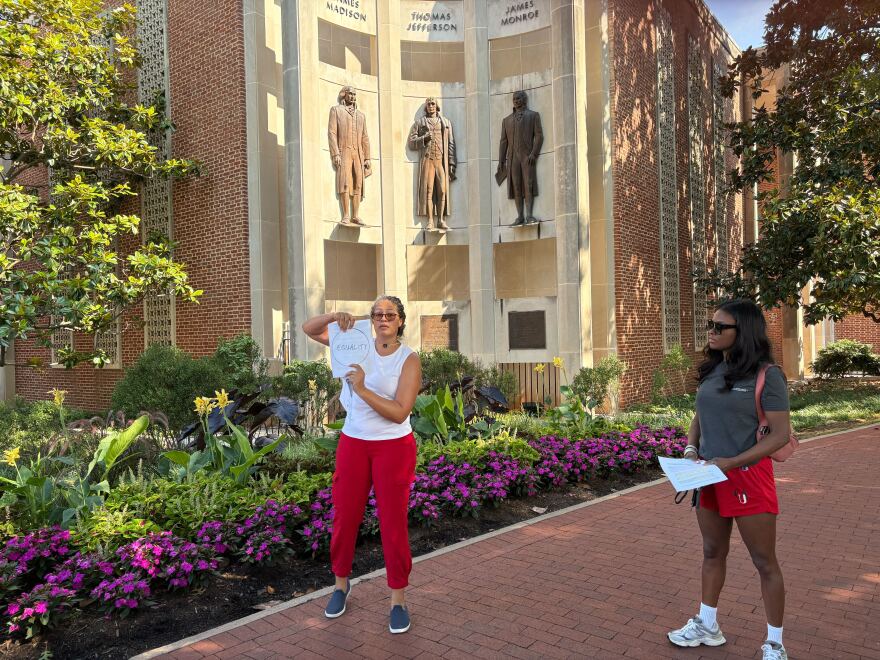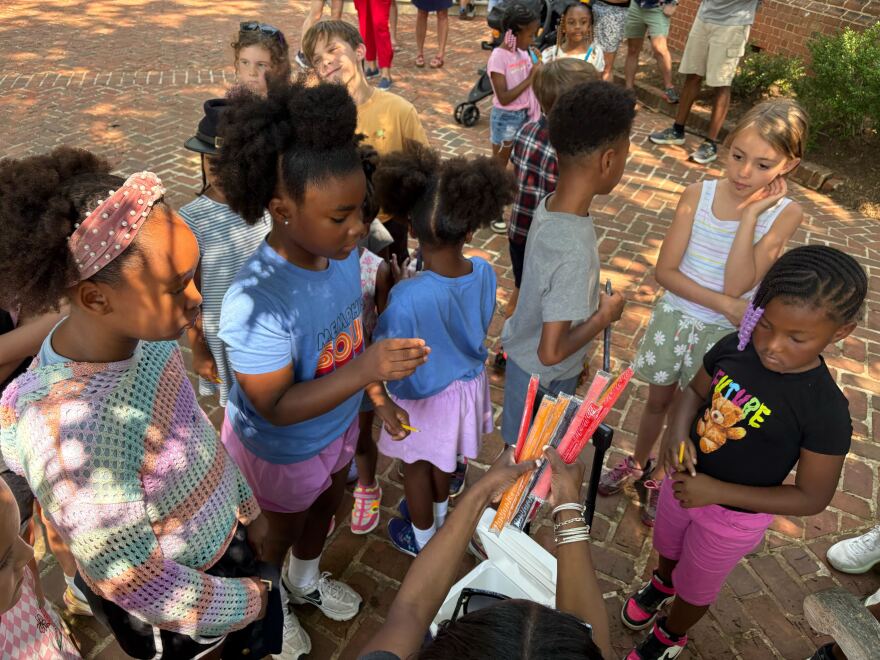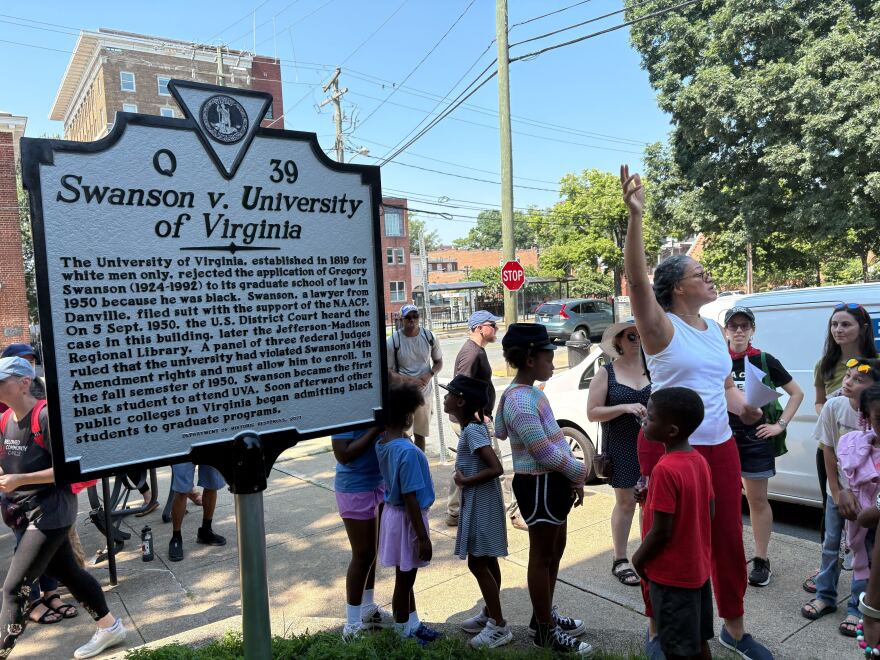On a sunny Fourth of July morning, a group of around 60 people was getting ready for a walking tour around downtown Charlottesville. Children scribbled drawings on the Free Speech Wall, which already had a large American flag etched in chalk next to a raised fist.
“United we stand, together we shine!” was written in a dark blue.
Jalane Schmidt, a University of Virginia professor of religious studies and founder of the UVA Memory Project, led the group to local Black history sites.
“This is our nation's anniversary, right?” Schmidt asked. “It's our birthday and so it's good to remind ourselves of the message of our founding charter, about the Declaration of Independence, all men are created equal.”
To kick off the tour, she instructed one of the touring children to “be loud” as she read the first few lines of the Declaration: “We hold these truths to be self-evident that all men are created equal.”
As the group trekked from the Free Speech Wall to the Albemarle County Courthouse and then the James-Madison Regional Library, Schmidt regaled them with stories of Black people in Charlottesville who fought to hold America to that promise of equality.
She highlighted James T. S. Taylor, a free Black man from Charlottesville who escaped Confederate conscription, joined the U.S. Colored Troops and fought in the Civil War — then was later elected to serve as a delegate at Virginia’s Constitutional Convention.

Schmidt was first asked to guide the child-friendly Black history tour by Dorothy Retland, an educator at Albemarle County Public Schools. That came after Schmidt led another civil rights tour to the Equal Justice Initiative’s Legacy Museum in Montgomery, Alabama.
In Montgomery, Retland saw soil from the lynching of John Henry James, a Black man who was murdered in 1898 by a mob of unmasked white men. The ground was ceremonially gathered and hand-delivered to the museum 120 years later.
“It literally comes from Charlottesville,” Retland told VPM News. “So to go to a museum all the way in Alabama and to see something that's in Charlottesville, in my backyard, to me is impactful to not just understand overall history, but understand your own history.”
Dorothy Retland shared pictures of the soil from the lynching site with her four children, who had more questions, so she went back to Schmidt. Then they decided to organize a family-friendly walking tour on July Fourth for the Charlottesville community. The goal: to highlight local spots of both Black tragedy and triumph on the United States’ 249th birthday.
At the courthouse, Schmidt told the tour group about John Henry James. In 2023, an Albemarle County judge tossed out the 125-year-old indictment against James, which had been first issued after his murder.
“He was an ice cream vendor,” Schmidt told them. “He went around the streets here, and he brought joy to children. So that’s how we want to remember him.”
Here, organizers also passed out Pedialyte freezer pops so the children could stay hydrated in the 87-degree Fahrenheit heat.

The tour ended at the Jefferson-Madison Regional Library, which was once the old federal courthouse, with a discussion of Gregory Swanson — the first Black student admitted to UVA Law School. Today, there’s a historic marker honoring him outside the library.
Malia Retland, 8, said she learned a lot on the tour.
“It kind of made me feel sad, because Black people really did not deserve that, and they should have been treated better and or at least equally. And I'm also thankful for the people who helped so today that we can have a good life,” she said.
Malia added that she particularly enjoyed the popsicle break.
Ashley Brown walked the tour with her 7- and 9-year-old daughters. She thought it was the perfect event for the Fourth of July, because she said everyone needed to be reminded of how America got to this point in history.
“I come through here quite often, but you never take a moment to really read the signs or stop and really acknowledge the history that this place holds,” she said. “So it was very fascinating.”
Oliver Calderon, 11, also called the tour interesting, and not just because he learned what the word “descendant” means: “I also learned about the historic places over here.”
His mother, Jessica Calderon, said she was glad she could share this experience with him. She’d visited these sites, but hadn’t realized the history behind them.
“I learned a lot, and it's always good to know what happened, the history in your local community,” Jessica Calderon said.

Schmidt has hosted local historical walking tours since 2017, which Marissa Wendte thinks should be held in every city.
“I think that something this significant needs to happen, particularly with the political climate right now,” she said. “It's important to learn so we don't repeat.”
Dorothy Retland told VPM News she views events like these as investments into her children’s future — a future that they can’t necessarily see right now.
“I think these kinds of events allow kids to hear history and then make their own informed decisions about how they see the world and how they choose to treat people,” she said. “And my hope is that my kids always know who they are, and despite what history looks like, and despite what history tells them, they're still beautiful, and they're brilliant and they have the ability to basically accomplish anything they want to.”



